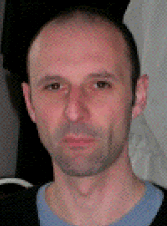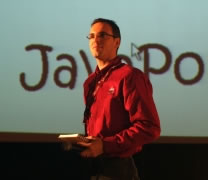
Java EE 5 Technology Overview
26-27 September 2006 (14-21)
Location: Sofitel Diegem (Diegem near Brussels (Belgium))
Presented in English by
Price: 980 EUR (excl. 21% VAT)

This event is history, please check out the List of Upcoming Seminars, or send us an email
Check out our related in-house workshops:
- Google BigQuery in Practice (INHOUSE WORKSHOP - On Request)
Learning Objectives
Why do we organize this seminar ?
In this two-day seminar, you will learn some of the key new features of the upcoming Java EE (Enterprise Edition) 5 platform and how it simplifies the development of enterprise applications. During the first day of this seminar, Stephan Janssen will present an executive overview of Java EE 5 by putting everything in perspective. Stephan will explain (and compare) the many options for developing enterprise Java applications. During the second day, you will get more technical insight in the novelties of Java EE 5, in particular EJB 3.0, Java Server Faces and the new additions to support service-oriented development. Although this seminar is optimally "consumed" as a two-day seminar, it is possible to attend only the executive overview or the more technical overview.
The seminar starts with a closer look at the Java EE status and roadmap. Major features of Java EE 5 are Ease of Development (EoD) enhancements using Plain Ordinary Java Objects (POJO) based persistency. As a result, EJB development gets greatly simplified. We will also look at how annotations can be used for defining persistence units, Web services, enterprise beans and dependency injection within Java EE 5.
Because most companies have been using J2EE for some time, and have probably tried to simplify and accelerate J2EE development using Spring, Hibernate and Struts, we will also cover the impact of Java EE 5 on the existing J2EE API's, the Spring and Struts frameworks (open source application frameworks that made J2EE development a whole lot easier), as well as the Hibernate persistency solution and its relationship with EJB 3.0.
You will receive an introduction to the drag and drop web application development with JavaServer Faces. We'll discuss the extensible UI component model, designed to use for tools, and explain how it works and what tools are available. We will also look at Ajax, the new paradigm for building rich internet applications.
Because of the success of service-oriented architectures and Web services, we will also look at how JEE5 simplifies SOA and Web services development, in particular how JAX-WS 2.0, annotations and dependency injection can simplify the programming model. Also: how does REST fit in, and how does it compare to SOAP ?
Why should you attend this seminar ?
This two-day seminar gives a pragmatic overview of the Java EE 5 platform.
By attending this seminar, you will get a good understanding of what is important in Java EE 5, why this was included, and what the advantages and disadvantages of the available options are. The first day give you the higher-level overview, while the second day looks more in-depth at the technical details of Java EE 5.
Who should attend this seminar ?
This seminar is targeted towards solution architects, software developers and project managers who want to know how Java EE 5 looks and feels like.
This seminar is particularly useful for:
- Technical IT managers who are responsible for Java development
- Solution architects and project managers who want to design, develop and integrate applications
- Software developers and anyone else who want to see the bigger picture of Java Enterprise Edition
Full Programme
DAY 1: An Executive Overview of Java EE 5
- What were the main drivers for the change ?
- What is Aspect-Oriented Programming (AOP), dependency injection, ease of development, ... ?
- The need to improve productivity
- The move from thick clients to thin clients and to AJAX
- How can you position Java EE 5 vs. J2EE vs Spring/Hibernate/Struts ?
- The past, present & future releases of Java EE
- An Introduction to:
- Web Services
- Dependency Injection
- EJB and JPA
- From JSP and servlets to JSF, JavaServer Faces (JSF)
- Packaging
- SOA adoption in Java EE
- SCA: the Service Component Architecture
- Building composite applications using SCA/JBI and BPEL
- Web Beans and Seam
- What is happening with the Spring framework ?
- The effect of Ruby on Rails (and of scripting in general) on the Java community
DAY 2: Technical Overview of Java EE 5
- Major novelties in Java EE 5
- New and updated API's in Java EE 5
- JSP & servlets
- JavaServer Faces abstraction layer
- Do's & dont's in JSF
- Tools for JSF
- The impact of AJAX for building Rich Internet Applications
- What about Swing ?
- Business layer and architecture
- Major upgrades in JEE5 for supporting Web services and SOA
- JAX-RPC, JAX-B, JAX-WS
- Going to Web services-based applications
- The role of an ESB (Enterprise Service Bus)
- POJO's, annotation & Dependency Injection
- JPA (Java Persistency API)
- Hibernate vs. EJB 3.0
- EJB 3.0 overview
Speakers

Kristof Vanbecelaere graduated in 1990 and holds a Master in Computer Science from Vrije Universiteit Brussel. He started his career as a software engineer for a spin-off company of the VUB in the area of client-server document retrieval systems. He developed object-oriented C++ GUI applications for colour management systems at Agfa-Gevaert.
Kristof spent 9 years at Sony developing operating systems and Java-based middleware for digital set-top boxes and integrated digital TV. In recent years he became a J2EE-convert and is now a Java Developer for JCS Int. with a keen interest in Java Server Faces as the main web technology for the next decade.

Peter Van Geenhoven graduated as Master in Computer Science in 1997 from the Brusselsí Free University, submitting a dissertation that introduced an MVC framework in the Java AWT library (JDK 1.0). At about the same time, Sun released JDK 1.1 which featured a virtually identical MVC framework. Ever since, Peter has worked as Java consultant for numerous customers in the automotive, financial and government business areas. Solutions he worked on ranged from simple applets, over web applications to full-fledged EJB en web service based JEE solutions with back-end integration to legacy systems such as AS/400 and CICS-based mainframe systems. His hands-on experience was also valued by IBM International Education where he taught the Sun courses on Java, and the IBM courses on VisualAge for Java, WebSphere Studio, WebSphere Application Server, and WSAD. Peter currently holds the position of technical project leader/senior developer at JCS/Dolmen.

Stephan Janssen has been using Java since its early releases in 1995 with experience of developing and implementing real world Java solutions in the finance and manufacturing industries. In 1998 he founded JCS Int. a Sun authorized Java Center with an exclusive focus on J2ME, J2SE and J2EE since 1997. JCS is also the very first Belgian Java company to speak at JavaOne 2003.
He is also the founder and chairman of the Belgian Java User Group since 1996 and has been organising JavaPolis in Belgium since 2002.
Stephan was selected by BEA Systems as the first European (independant) BEA Technical Director and was recognized by the Server Side as one of the 54 Who is Who in Enterprise Java 2004. In 2005 Sun recognized Stephan's efforts for the Java Community and engaged him in the Java Champion project.
He has spoken at numerous Java and JUG conferences including Java '98 (UK), JAOO '99 (Denmark), JavaDays 2000 (Norway), TMAB (Belgium), JavaPolis 2002-04-05, JavaOne 2003 etc.
Questions about this ? Interested but you can't attend ? Send us an email !